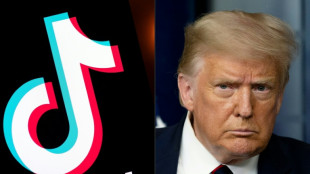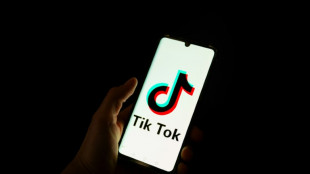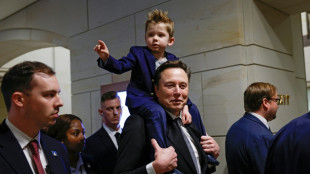
-
 Indian court finds man guilty in notorious hospital rape case
Indian court finds man guilty in notorious hospital rape case
-
Medvedev fined $76,000 for Australian Open antics

-
 S. Korea's president in court as investigators seek to extend detention
S. Korea's president in court as investigators seek to extend detention
-
Gaza ceasefire to begin Sunday morning, after Israeli approval

-
 Trump administration plans mass immigrant arrests next week: incoming official
Trump administration plans mass immigrant arrests next week: incoming official
-
Russian attack kills four in Kyiv

-
 Monfils primed to do Australian Open 'damage' after 17-year first
Monfils primed to do Australian Open 'damage' after 17-year first
-
Teen qualifier Tien surges into Australian Open last 16

-
 Sinclair, Warrican spin Pakistan to 230 all out in first Test
Sinclair, Warrican spin Pakistan to 230 all out in first Test
-
'Lucky loser' Lys makes history to reach Australian Open last 16

-
 South Korea's president in court as investigators seek to extend detention
South Korea's president in court as investigators seek to extend detention
-
Swiatek destroys Raducanu, Monfils stuns Fritz at Australian Open

-
 Veteran Monfils stuns fourth seed Fritz at Australian Open
Veteran Monfils stuns fourth seed Fritz at Australian Open
-
TikTok's journey from fun app to US security concern

-
 US TikTok ban looms as Trump seeks last-ditch solution
US TikTok ban looms as Trump seeks last-ditch solution
-
Swiss Ruegg wins uphill finish to lead women's Tour Down Under

-
 Rybakina needs physio 'magic' after fighting on at Australian Open
Rybakina needs physio 'magic' after fighting on at Australian Open
-
Swiatek destroys Raducanu as Sinner steps up Melbourne defence

-
 Impeached South Korean president arrives for arrest warrant hearing
Impeached South Korean president arrives for arrest warrant hearing
-
Irving shines as Mavs roll Thunder, Nuggets scorch Heat

-
 History-making 'lucky loser' Lys into Australian Open last 16
History-making 'lucky loser' Lys into Australian Open last 16
-
Three-set specialist Navarro credits billionaire dad for stamina

-
 Rampant Swiatek has ball 'listening' to her in rout of Raducanu
Rampant Swiatek has ball 'listening' to her in rout of Raducanu
-
Scratchy Navarro dumps Jabeur out of Australian Open

-
 In Brazil, disinformation deals Lula a bruising defeat
In Brazil, disinformation deals Lula a bruising defeat
-
South Korea court to decide on extending president's detention

-
 Slew of satellite projects aims to head off future wildfires
Slew of satellite projects aims to head off future wildfires
-
TikTok could 'go dark' in US Sunday after Supreme Court ruling

-
 Brutal Swiatek routs Raducanu to reach Australian Open last-16
Brutal Swiatek routs Raducanu to reach Australian Open last-16
-
Menendez brothers' hearing delayed by LA fires

-
 Tsunami survivor Sasaki overcame tragedy to reach MLB
Tsunami survivor Sasaki overcame tragedy to reach MLB
-
'We're entertainers': Pegula backs Djokovic call to jazz up tennis

-
 Marathon man Draper warns Alcaraz he's in for a battle
Marathon man Draper warns Alcaraz he's in for a battle
-
Israeli government approves Gaza ceasefire deal

-
 Hoffman, Hoey share PGA Tour lead in La Quinta
Hoffman, Hoey share PGA Tour lead in La Quinta
-
Japanese star Sasaki announces joining LA Dodgers

-
 39 dead in Colombia guerilla violence, govt suspends peace talks
39 dead in Colombia guerilla violence, govt suspends peace talks
-
The video games bedeviling Elon Musk

-
 Gamers tear into Musk for 'faking' video game prowess
Gamers tear into Musk for 'faking' video game prowess
-
Kvaratskhelia signs for Paris Saint-Germain from Napoli

-
 US Treasury to take 'extraordinary measures' to avoid debt default
US Treasury to take 'extraordinary measures' to avoid debt default
-
Lille warm up for Liverpool clash by going third in Ligue 1, Monaco lose

-
 Man Utd and Scotland great Denis Law dies aged 84
Man Utd and Scotland great Denis Law dies aged 84
-
Frankfurt heap more pain on Dortmund as Marmoush eyes Man City move

-
 Canada vows 'Trump tax' on US in response to tariffs: minister
Canada vows 'Trump tax' on US in response to tariffs: minister
-
'More sad than shocked': TikTok users brace for ban

-
 Global equities rally, pushing London and Frankfurt to new records
Global equities rally, pushing London and Frankfurt to new records
-
US grounds SpaceX's Starship after fiery mid-air explosion

-
 Frankfurt heap more pain on struggling Dortmund
Frankfurt heap more pain on struggling Dortmund
-
With Kvaratskhelia sale, Napoli turn page on historic Scudetto triumph


TikTok's journey from fun app to US security concern
As a law that could get TikTok banned in the United States is poised to go into effect, here is a look at the rise of the video-sharing social media platform.
- Genesis -
In 2016, Beijing-based ByteDance launched Douyin, an app for sharing short videos, in the Chinese market.
ByteDance released TikTok for the international market the following year, shortly before buying "lip-synching" app Musical.ly and merging it into TikTok.
The social network became a hit, with its algorithm serving up endless collections of short, looping and typically playful videos posted by users.
- Pandemic boom -
TikTok's popularity soared during the Covid-19 pandemic declared in 2020, as people enduring lockdowns relied on the internet for diversion and entertainment.
As a result, authorities worldwide began eyeing TikTok's influence and addictive appeal.
TikTok became one of the most downloaded apps in the world, as officials grew increasingly wary of the potential for the Chinese government to influence ByteDance or access user data.
India banned TikTok in July 2020 due to tensions with China.
- Targeted by Trump -
While Donald Trump was US president in 2020, he signed executive orders to ban TikTok in the United States.
Trump accused TikTok, without proof, of siphoning off US users' data to benefit Beijing and of censoring posts at the direction of Chinese officials.
Trump's decision was made as his government clashed with Beijing on an array of issues.
During a failed bid for reelection in 2020, the Republican continued to campaign on an anti-China message.
Between legal challenges and Trump's loss to Joe Biden in that year's presidential election, the executive orders did not take effect.
- Billion mark -
In September 2021, TikTok announced it had one billion monthly users worldwide.
But concerns grew about TikTok users facing risks of addiction, propaganda and spying.
In 2022, BuzzFeed reported that ByteDance employees based in China had accessed TikTok users' non-public information.
ByteDance tried to cool privacy concerns by hosting user data on servers managed in the United States by Oracle.
The move did not ease concerns, however, with TikTok banned from devices used by the US military.
An array of other government agencies and academic institutes followed suit, forbidding members from using TikTok.
TikTok's Singaporean chief executive Shou Chew was grilled by members of the US Congress during a six-hour hearing in March 2023.
- Sell or go -
TikTok was back in the hot seat in the United States in 2024 when President Joe Biden authorized a law requiring TikTok to be banned if ByteDance does not sell the app to a company not associated with a national security adversary.
Washington's stated aim was to cut the risk of Beijing spying on or manipulating TikTok users, particularly the 170 million US users of the app.
TikTok remains adamant that it has never shared user data with the Chinese government or done its bidding at the social network.
ByteDance sued the US government, arguing the law violates free speech rights.
A final decision in that case was made Friday by the US Supreme Court, which upheld a law going into effect on January 19.
In a major defeat for TikTok, the court ruled that the law does not violate free speech rights and that the US government had demonstrated legitimate national security concerns about a Chinese company owning the app.
President-elect Trump, who returns to office on Monday, has signaled he might intervene on TikTok's behalf.
The company, however, has said that unless the outgoing Biden administration makes "definitive" assurances that the law will not be implemented, it would be forced to "go dark."
Th.Berger--AMWN
